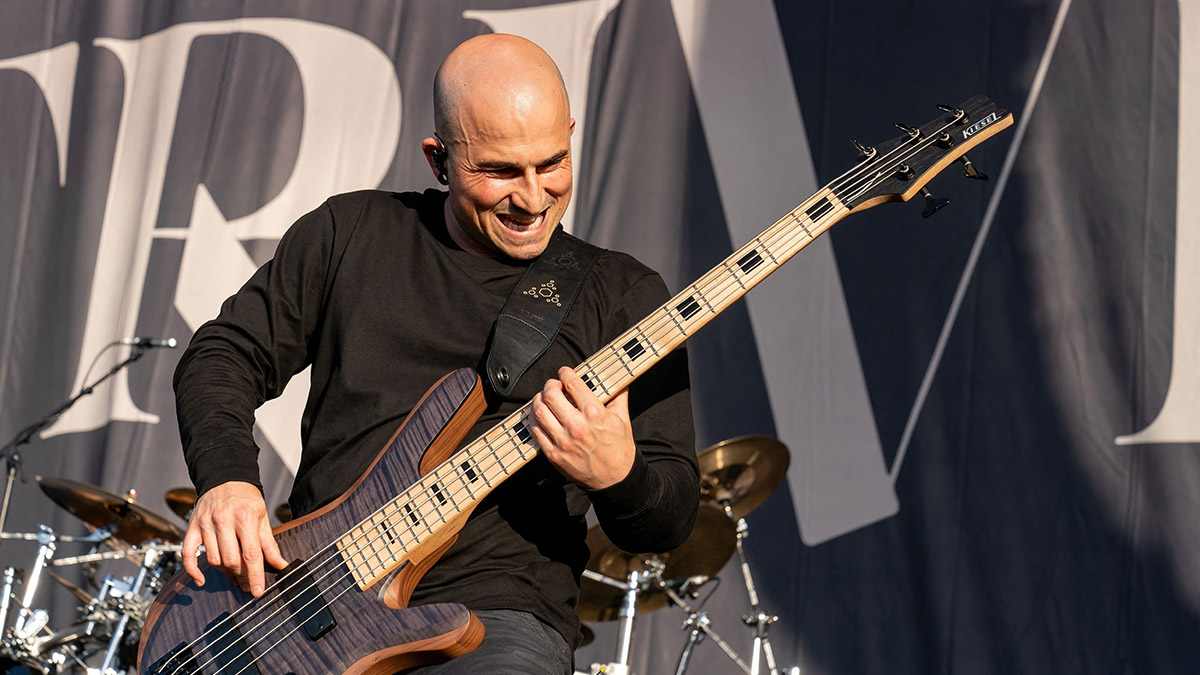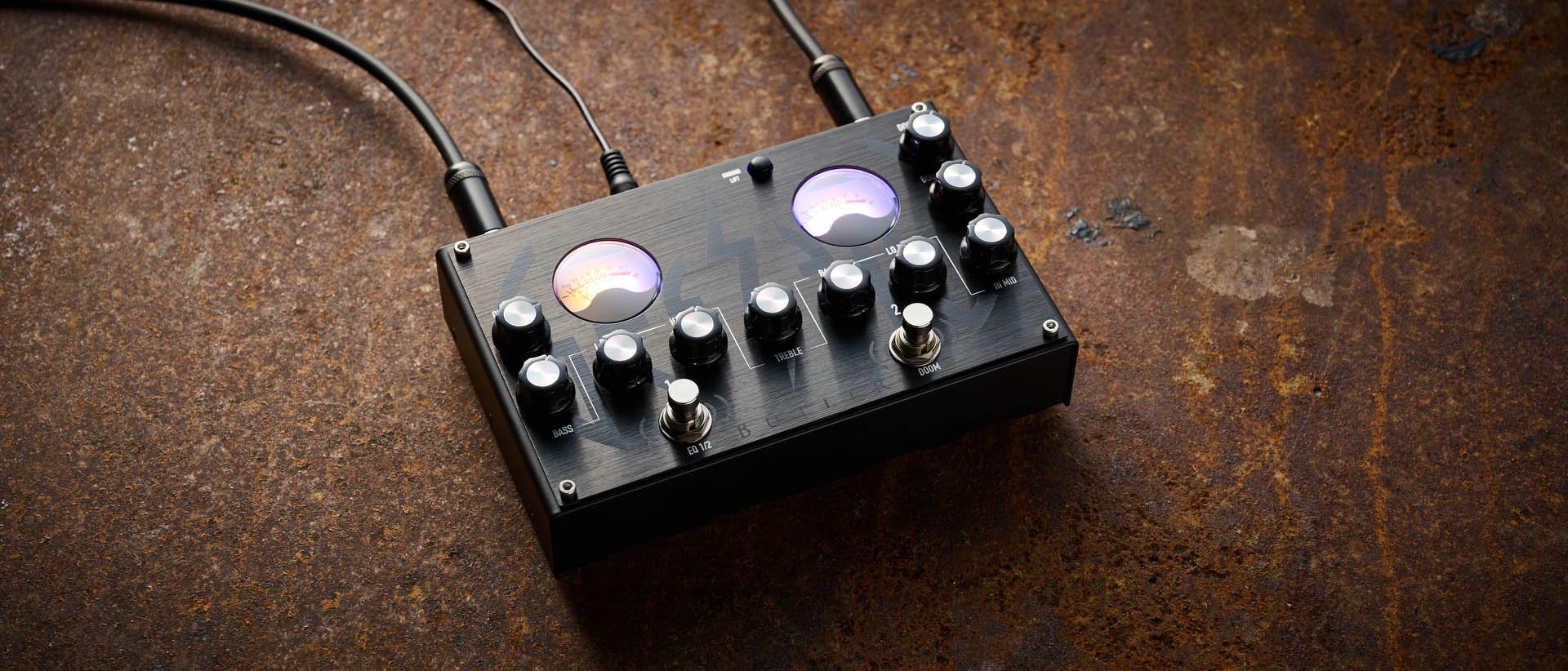Paolo Gregoletto: “I’ve never needed a side project because Trivium play everything. We’re always trying to push ourselves”
The Trivium bassist on Metallica's influence, live music, and how space, dynamics and an omnivorous approach to metal songwriting makes In The Court Of The Dragon sound so huge

Trivium’s 10th album is the most intricate, technical, and downright hefty in their oeuvre, even by their sky-smashing standards. Bassist Paolo Gregoletto explains that In The Court Of The Dragon is built both on the back of previous record What The Dead Men Say and the forced weirdness of the pandemic.
“We hope that people can really hear the amount of time and attention to detail we put into this one,” he tells us. “From the songs themselves, from our individual playing to the orchestration to the mix, to the way everything sounds a little bit different than the last record, it’s a little heavier, a little bit more aggressive and progressive.”
If there was one upside for Trivium of the lockdowns and lack of live performances, it was the time it freed up to really work on material – both in pre-production and during the recordings itself.
“We turned every rock over we could to make sure we’re not leaving anything out of this record. With my bass playing, I wanted to step it up a little, with cooler fills, cooler countermelodies, or maybe by playing a rhythm a little bit different than the guitars to bring something else out of a song. I’m very, very proud of this one – we really dug in and pulled a little bit more out of ourselves and our playing.”
The band had a first-hand brush with COVID-19 in 2021, with both frontman Matt Heafy and the band’s tour manager catching the virus. Thankfully, both recovered, but it brought home the fragility of the new normal in which we live and work.
“The worst case scenario came, and we overcame it, and we were lucky,” says Gregoletto. “You know, it’s just part of life at this point. It’s going to be part of touring for the foreseeable future. Our priority was to keep everybody as safe as possible from the outset.”
tried to play live as much as possible even if they weren’t big shows or anything special. That was always a big, big thing for me: To play in front of people
At the time, the aspiring musician was listening to a lot of alternative music, including Blink-182, and in particular their Dude Ranch album, which he says had the energy and fast songs that really spoke to him. But the light really switched on when he saw Metallica on MTV.
All the latest guitar news, interviews, lessons, reviews, deals and more, direct to your inbox!
“I was like, ‘Okay, this is something different. This feels more serious’. It felt like the kind of music I had been waiting for. And once I discovered them, you go backwards and you get all the records they made. And then you start to find out about other bands that were around when they were around, and who influenced them. It’s a lifelong thing once you get into it.”
Slayer and Megadeth also loomed large, as did Iron Maiden – all bands that Trivium have subsequently performed with on many occasions. Not that it was always simple to get hold of new music, which was particularly frustrating for someone wanting to play along with the bass-lines and learn his craft.
“I was a little bit before Napster, so buying a record was kind of a commitment to it. The first couple of years, I had my jewel case of CDs that I would listen to religiously and try to learn the songs. I would buy the tab books or get whatever guitar magazine had bass tabs in it.
“I really spent a long time doing that, and I tried to play live as much as possible even if they weren’t big shows or anything special. That was always a big, big thing for me: To play in front of people. It was such a big foundational thing. Not only the preparation for the show, but also just learning how to be in front of an audience and how to speak to a crowd.”
He was plucked from his band Metal Militia to join Trivium as they began to demo new stuff for their second album, Ascendancy, in 2004, and he’s been a core member ever since.
All these years later, Gregoletto is still a big fan of taking lessons, revealing that he did so from the first time he picked up a bass. “There’s not a right way for anything, because you develop your own style and like what you like, but there are foundational techniques that I felt I wasn’t gonna be able to teach myself.”
Indeed, on joining Trivium, he had to refine his skills immediately, with one particular modification necessary.
“Right when I joined it was the only time in my career that I’d ever used a pick, because they did all these fast triplets which I didn’t know how to do yet. I had to build up to that, playing with three fingers, and once I got that down I switched back.”
Theory and context are key to his musical education, he adds.
“I wanted to understand basic concepts of theory, and learn all kinds of different things – tapping, slap bass, harmonics – so that when I read a tab or heard a song I would be able to recognize the technique.
“All that was very helpful, because being able to hear something and then play it without error, working it out in my head, really helps. It also helps outside of playing bass; being able to hear certain notes gives you much better pitch for singing.”
Trivium’s willingness to experiment with tempos, styles, riffs and rhythms makes for an epic sound. Gregoletto says that this makes practice absolutely essential to be able to deliver these often technically challenging songs accurately.
“You really have to know all the different types of genres, because we switch between them all during our songs. One part’s a death metal riff, followed by a big rock part, or something more progressive. You need to know how to play all those styles, how to go from really fast stuff with all the tempo changes, to very slow, melodic things.”
He adds: “You have to know how to be slow: Where there needs to be space, locking with the drums, and where it pops out more. I love having that level of dynamic in our music. I feel so fulfilled in the band – I’ve never felt I needed a side project because Trivium play everything. We’re always trying to push ourselves.”
All of which brings us back to the lines he plays on In The Court Of The Dragon, which are some of the most intricate of his career. He gives us an overview of how the album came together.
“I wrote Shadow Of The Abattoir out of order. I had the middle part first, which I wrote in 2020 on guitar, then the intro a couple of months after that, and then for the main part I was playing chordal stuff on my Warwick that was driving the melody.
We’ve gotten to the point now where these things can be much more seamless
“I knew Corey [Beaulieu, guitar] would come up with a counter-melody, so we jammed it out, and I knew I wanted it to start with a minimal, somber tone. I knew that there’d be a tempo change and a change of feel. Each section served a purpose to push the song forward. All these elements would have been much harder for us to achieve 15 years ago. We’ve gotten to the point now where these things can be much more seamless.”
That seamless power is now hitting the road, bursting with pent-up energy and the fire of a recently-incarcerated dragon. Gregoletto is delighted at the prospect. “Music is positivity. There’s a release and energy that comes with seeing live music that is positive, no matter what genre. Whenever I see live music, it makes me happy – and I’m glad that we can do that for people.”
- In the Court of the Dragon is out now via Nuclear Blast.
